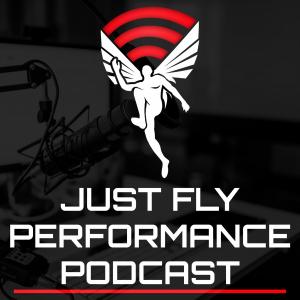Just Fly Performance Podcast

188: Scott Robinson on The Nervous System, Overcoming Mental Barriers and Advanced Athlete Learning Concepts | Sponsored by SimpliFaster
Today’s episode features neurology expert and personal trainer, Scott Robinson. Scott is an Applied Movement Neurology (AMN) master practitioner and the creator of AMN Neuro-Flexibility. He has worked successfully with all levels of neurological complexity in his time training and coaching a wide variety of clients. Scott is a specialist in dealing with a variety of neurological issues, such as weakness, pain, compensations, range of motion and trauma to the emotional systems, amongst many others. Scott is a former athlete in Taekwondo and has more than 20 years of experience in Applied Movement Neurology. Scott also runs the Instagram account @the.brain.guy and is a presenter and practitioner at integrated vitality retreats. The nervous system is always an important and popular topic in the world of not only athletic performance, but human performance and development in general. Our emotions and subconscious state, as well as our bioelectric network are all substantial players in how we train and recover, as well as stay healthy in the process. Good coaches know these elements intuitively, but we are now starting to be able to point out the science and ideas behind it all. Today’s show takes a step back from sets, reps and exercises, and looks at these higher-order influences on athletic performance from a perspective of the brain and nervous system. On the show, Scott talks about inhibitive factors of the nervous system, as well as the important leap in looking from athletes only in a chemical perspective, and to a bioelectric perspective, which has implications running into things like fascial performance and therapeutic modalities. He also gets into the role of emotions and beliefs and their impact on training, as well as methods that can be used to help clear these inhibiting factors. Finally, we get into an awesome talk on the critical factors by which learning can take place in a session, and how this impacts our entry point into the workout itself, drawing a lot of parallels with my prior show with Rafe Kelley. This show starts great, and just gets better as we go along, and has tons of gems throughout that are truly game-changing for any coach or athlete. Today’s episode is brought to you by SimpliFaster, supplier of high-end athletic development tools, such as the Freelap timing system, kBox, Sprint 1080, and more. View more podcast episodes at the podcast homepage. Key Points Scott’s background as a distance runner and martial artist, as well as how he got into neurology and brain-science and its connection with athletics Elements that hold the nervous system back from producing the strength it is capable of (bioelectric dysfunction, nociception, etc.) How Scott looks at a client from a bioelectric perspective How foam rollers really work in regards to the body, the nervous system and performance The role of emotions in training and how emotion plays a role in adapting to exercise The use of emotional freedom technique to help clear limbic trauma that is inhibiting performance on the sporting field Why the “Haka” is so powerful for the All-Blacks, but also an unfair advantage in regards of it’s emotional impact on the other team Ways that we can allow our brain to learn better, particularly in context of physical activity The role of attention and novelty in athlete learning How to use novelty in warm-up games to stimulate and drive urgency and attention and drive better learning “Bioelectricity underpins everything in the nervous system… I work with that bioelectricity and anywhere in the body there is dysfunction or pain or weakness, or anything that’s not quite right, you’ll find that there will be an altered bioelectric charge” “Medical science tends to look at the body almost from a chemical perspective” “The extracellular matrix is kind of like the body’s wi-fi network” “One of the biggest things I see in terms of chan...






 Visit Podcast Website
Visit Podcast Website RSS Podcast Feed
RSS Podcast Feed Subscribe
Subscribe
 Add to MyCast
Add to MyCast